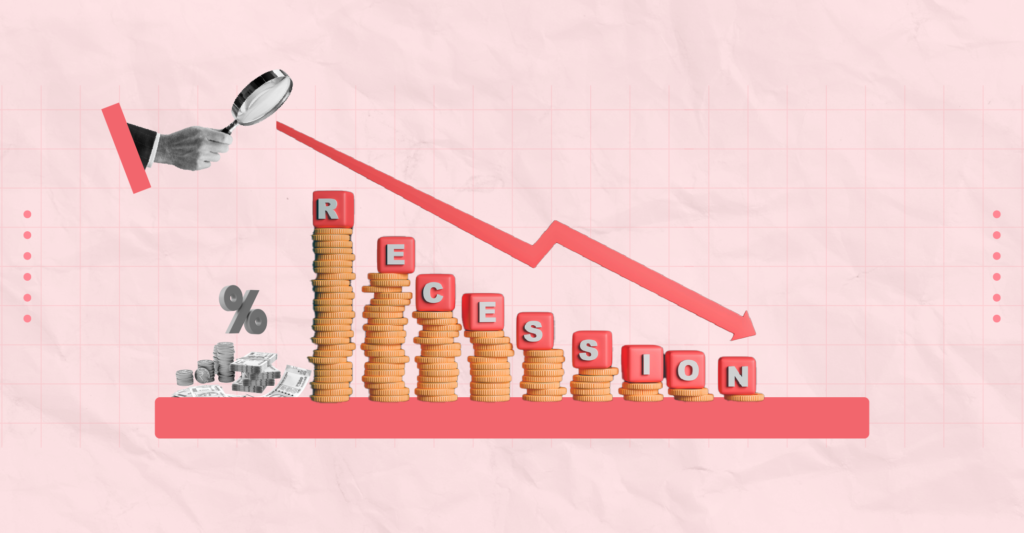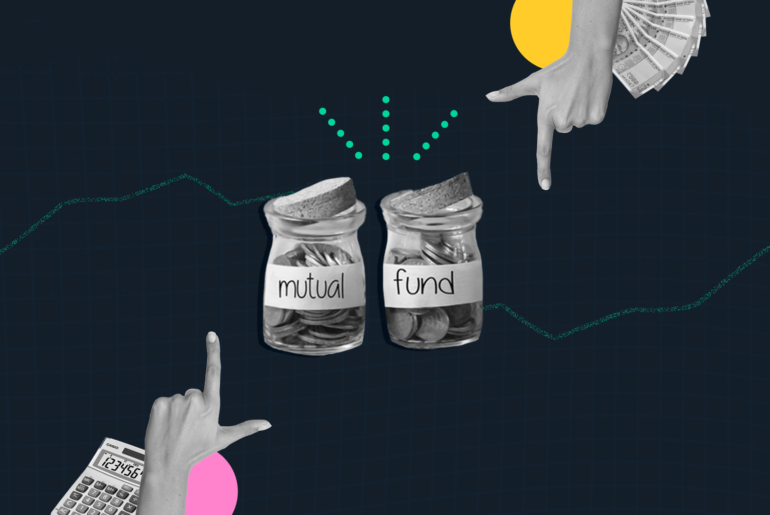Last Updated on Feb 9, 2023 by Anjali Chourasiya
Did you know that during the last recession, India saw the highest unemployment rate in the last 45 yrs? Scary, isn’t it? Especially with the looming threat of the upcoming recession in 2023. Whether it happens or not, one should be prepared for it. Hence, in this article, we’ll look at a checklist on how to prepare for a recession, what it exactly means, its signs, mistakes to avoid during the recession, recession-proof jobs, the answer to ‘is a recession coming to India?’, and more.
Table of Contents
How to prepare for a recession?
You can’t control the market but can learn how to prepare and protect yourself from losses. Here are six tips to recession-proof your professional life and portfolio. You can use this list as a checklist to determine if your financial health is recession-proof.
1. Identify your financial priorities
Reviewing your personal finances should be the first step in identifying your financial health. And while you are doing this, review your financial goals and plans according to your current income and expenses.
2. Focus on budgeting
Evaluating your budget every month is one of the most effective ways to curb unnecessary expenses. Figure out areas where you are spending more and cut them out. This is a crucial step which will help you navigate your financial health, and hence, it is always worthwhile to take the help of a financial advisor.
3. Build an emergency fund
As most investors and financial advisors suggest, you should have an emergency fund to cover three to six months of your expenses. The savings for your emergency fund should not compromise your retirement goals. It can keep you afloat in case of unemployment and emergency situations. Moreover, adding extra money to your emergency fund can be fruitful in the long run due to rising inflation and the potential threat of recession.
4. Prioritise paying off high-interest debt
Debt may make something look more affordable with a bit-size payment every month, but you are paying more than the retail price. And when preparing for a recession, it is better to have as low debt as possible. You can start the process of paying off debt and building up your cash reserves as soon as today.
5. Evaluate your investment options and diversify
It is important to do a sanity check on your portfolio at regular intervals. It will help you stay away from red-flag stocks. For this purpose, you can use Tickertape. Our portfolio feature makes analysing your investments fairly easy. You can
- See your investments across sectors and market caps through the flow chart
- Know how well-diversified your portfolio is using the diversification score
- View your top holdings and their weightage in your portfolio in a jiffy
- Understand how your portfolio is valued along with its volatility
- Score your portfolio based on key fundamental and technical indicators
- Identify stocks with potential red flags in your portfolio
- See how your portfolio is expected to perform in the next 1-yr
With this, you can protect your portfolio against volatility at the right time. And with a diversification score, you can check how volatile your portfolio is. Ranging from 1 to 100, the higher the score, the more diversified and less volatile your portfolio is. With diversification, you can have well-performing assets compensating for poorly performing ones, reducing overall risk for your portfolio.
To make it easier for you, Tickertape allows you to connect your broker account and transact directly from the platform. Analyse fairly and invest easily because #TickertapeHaiNa!
6. Invest in yourself
Investing in your career is a great way to build job security and protect yourself from lost income during a recession. Here are some ways you can achieve this –
- Learn new skills to advance your current career prospects
- Study to enter a recession-proof field like healthcare
- Build a personal brand
- Learn new skills to generate income streams via freelancing
You can also learn about money management and personal finance to take full control of your financial health and navigate it according to your goals.
What is a recession?
A recession is an economic downturn. It is a sustained period of negative or weak Gross Domestic Product (GDP) growth where unemployment rises and industry activity declines. In simple words, a recession is a period when economic growth stops and starts shrinking. This happens when the total value of goods and services produced in the country (GDP) declines for two consecutive quarters.
Signs of a recession
There are five indicators that economists and analysts look to determine whether or not the economy is in a recession –
- Negative GDP for two or more quarters.
- A decline in consumers’ purchasing power, i.e. consumers’ real income.
- Inflation-adjusted retail and wholesale sales of goods.
- The strength of the manufacturing sector (whether there is a trade surplus or deficit)
- A high unemployment rate (A rate of about 6% or higher indicates that the economy has already entered a recession.)
What Typically Happens in a Recession?
Recession repeats itself, but every recession is different.
During a recession, the economy slows down, meaning there is less production, fewer jobs and lower wages. This leads to a decrease in consumer spending and a decrease in business investment. As businesses experience lower profits, they may cut back on their investments or lay off employees, leading to higher unemployment. This, in turn, leads to further decreases in consumer spending, creating a vicious cycle.
Difference between the great depression and the recession
You might have heard about the ‘Great Depression’, which had captured the entire world in its darkness. But what is the difference between the great depression and the recession? Let’s find out.
| Points of difference | Great Depression | Recession |
| Definition | Severe decrease in economic activity due to a slowdown in industrial production, trade problems, etc. | The slowdown in economic activities is similar to the great depression, but the scale and severity are lower. |
| Time duration | It lasts for years. | It lasts for months. |
| Reach | It can impact almost the entire globe. | It is relatively narrower than the great depression and generally impacts a small group of nations. |
| Recovery | It takes years to recover from the impacts of the great depression. | It takes months to recover from a recession. |
Mistakes to avoid during a recession
Apart from preparing for a recession, it is crucial to make a note of things that you should not do during a recession. Here are the top five things –
- Do not take on any additional debt.
- Do not take financial decisions from fear.
- Do not forget to build and maintain an emergency savings fund.
- Avoid increasing your fixed expenses.
- Do not forget to have a backup plan in place.
Recession-proof jobs
There are some jobs which are recession-proof. They are usually less volatile and may even see growth during economic turbulence. For instance, the telehealth and cleaning sectors have seen massive growth during the Covid pandemic. Here are six recession-proof sectors –
- Health care
- Public safety
- Education
- Utilities
- Financial services
- Social work
As mentioned earlier, you can start studying for any of these recession-proof jobs and take a step ahead in securing your future from a global slowdown.
Is a recession coming in India in 2023?
The last recession India faced was during the Covid pandemic. According to Statista, the GDP of India fell to -6.6% in the year 2020. As you can see in the below-mentioned chart, the GDP fell in the year 2019 and then in 2020, causing a recession.
However, in the year 2021, the GDP grew and reached 8.68%. Now, if you look at the same graph, it is predicted that in the year 2023, the recession will come again. The International Monetary Fund predicted that growth in the Indian economy will slow down to 6.1% in 2023-2024 from 6.8% in the current financial year.
Going back to the chart, after 2021, the GDP fell to ~6.7%. And it is predicted that the GDP will fall even further in 2023 to ~6.06%, which technically means the recession may come. But will it really happen? Only time will tell. Therefore, it is worthwhile to stay prepared for another economic slowdown.
To conclude
Whether the world will face another recession or not is not in your control. But, you can gauge the financial instabilities it brings by focusing on recession-proofing your portfolio and professional life. To research various assets, analyse, manage your portfolio, gauge the stocks with red flags, and invest easily, use Tickertape. We help you make data-backed investment decisions with ease. Explore the platform today!
FAQs
When was the last recession?
The last recession in India was seen during the Covid pandemic. In the year 2020, the GDP of India fell to -6.6% from 3.74% in 2019, according to Statista.
What causes a recession?
Recession can occur due to a variety of factors. Some of these factors are
– Higher rates of interest
– Stock market collapse
– Decreased industrial production
– Decline in purchasing power
– Poor economic management
– War disruptions
– Credit crunch
– Unnatural Disaster of Deflation
How to prepare for the 2023 recession?
Here’s a checklist to prepare if an unfortunate recession knocks on our door in 2023:
– Identify your financial priorities
– Focus on budgeting
– Build an emergency fund
– Prioritise paying off high-interest debt
– Evaluate your investment options and diversify
– Invest in yourself
What should you avoid during a recession?
Preparing for a recession is important, and so is knowing what not to do. Here are five things you shouldn’t do during a recession-
– Do not take on any additional debt.
– Do not take financial decisions from fear.
– Do not forget to build and maintain an emergency savings fund.
– Avoid increasing your fixed expenses.
– Do not forget to have a backup plan in place.
What was the Great Depression?
The great depression was one of the greatest and longest economic turndowns in the history of the world. It lasted for ten years from the year 1929.
How long is a recession before it becomes a depression?
Recessions usually last between two and 18 months, with an average of ten months. Depressions are much longer and can last for several years. For instance, the great depression lasted ten years.




